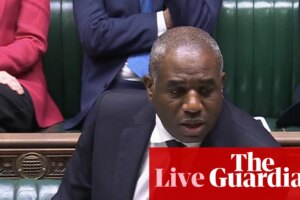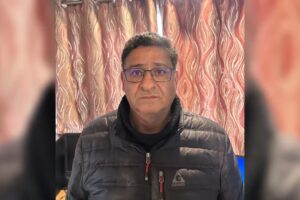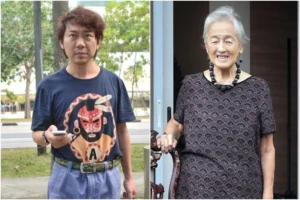
When Enes Kanter Freedom appeared on a basketball court in his Boston Celtics jersey and a pair of trainers emblazoned with the slogan “Free Uyghur”, the reaction from Beijing was swift.
“Literally at the half-time, they cancelled every Celtics game on television [in China] for the rest of the year,” the basketball player tells the Bureau of Investigative Journalism (TBIJ) and the Guardian. That game, in October 2021, marked a turning point in his career. “That’s when the NBA got really angry at me,” says Freedom.
Freedom, who has long been an outspoken critic of the Turkish government, had researched the issue after the concerned father of a fan challenged his silence on China’s treatment of Muslim minorities.
In Xinjiang, China’s westernmost region, President Xi Jinping’s “war on terrorism” has involved oppression and detentions as a means of forcing ethnic minorities to assimilate into the dominant Chinese culture. Uyghurs and other minorities have been imprisoned in reeducation camps and pressured into forced labor at factories across the country.
Freedom was already used to making statements in unconventional ways; he’d changed his surname from Kanter on becoming an American citizen. And as he dug deeper, he found it hard to believe that people weren’t more aware of what was happening in Xinjiang. So he decided to do something about it.
“I reached out to these artists around the world, and I told them to put all their struggles on the shoe,” he says. “And I’m gonna go out there and play basketball.”
That was the 11th year of Freedom’s NBA career. It would be his last.
Teammates began to warn him, he later testified in front of Congress, that he’d never play in the league again. Shortly afterwards, he was released from his contract – a move the NBA says had nothing to do with his activism.
The cancelled Celtics broadcasts weren’t the first time Beijing had punished the NBA: in 2019, Chinese state media pulled games from its schedule after NBA commissioner Adam Silver defended the actions of Daryl Morey, then a Houston Rockets executive, who had tweeted support for protesters in Hong Kong. The affair cost the NBA hundreds of millions of dollars.
China is a multibillion-dollar market for the NBA, with more basketball fans than the US has people. Freedom says the league is beholden to Chinese interests.
It’s also a huge platform for Chinese brands to advertise themselves to the world. The Chinese sportswear brand Li-Ning has been using NBA players to promote its footwear for over a decade, ever since Dwyane Wade ended his contract with Nike’s Jordan subsidiary and signed with the Chinese company in 2012.
Li-Ning and other Chinese brands like Anta and 361 Degrees now compete with legacy American companies for lucrative sponsorship deals. Over a dozen NBA players had deals with the three brands in 2022, according to analysis from ESPN.
Li-Ning has deals with the Golden State Warriors’ Jimmy Butler – also lured from Jordan in 2020 for a huge deal that includes various signature shoe lines – and the Houston Rockets’ Fred VanVleet, also president of the National Basketball Players Association. Anta sponsors stars including Klay Thompson and Kyrie Irving, while 361 Degrees’ roster includes the Serbian legend Nikola Jokić. (These sponsorship deals are made with the players directly and are not subject to NBA approval.)
None of these players’ representatives responded to requests for comment.
Now, TBIJ and the Guardian can reveal that all three brands are linked to the oppression Freedom highlighted on his trainers. And so is Nike.
Leveraging forced labor
Earlier this year a major investigation by TBIJ, the New York Times and Der Spiegel connected more than 100 global brands to the Xinjiang labor transfer scheme that moves ethnic minorities thousands of miles across China to work in eastern factories. The transfer scheme is a central pillar of the Chinese government’s systematic destruction of the Uyghur, Kazakh and Kyrgyz communities of Xinjiang.
Anta, Li-Ning and 361 Degrees are among the brands that directly own production sites linked to these human rights abuses. And those labels are also supplied by other companies participating in the labor transfer program.
A 361 Degrees factory in Fujian has taken Xinjiang workers for at least a decade: a “collective wedding” of Kazakh workers at the factory in 2015 referred to nearly 400 workers. Social media content from Xinjiang workers showing the factory compound was uploaded as recently as last year.
At least three factories supplying Li-Ning have used workers from the labor transfer scheme. One clip uploaded by a Uyghur worker shows a pair of black and silver Li-Ning trainers on a conveyor belt at a factory in Hubei.
“Life is too hard, but I don’t want to admit defeat,” reads the title of a video from a worker at a different Li-Ning supplier. “This guy is really ordering people to work a lot,” says the accompanying voiceover in Uyghur, referring to a Han Chinese supervisor who stands nearby, hands on hips. “If I don’t get out of here I know I’m gonna work myself to death.”
Enes Kanter Freedom’s sneakers are seen before a 2021 game in Boston. Photograph: Omar Rawlings/Getty Images
361 Degrees’ sponsorships stretch beyond the NBA to World Aquatics events and Olympic runners. Li-Ning’s partnerships, meanwhile, include China’s Olympic delegation and a clutch of young badminton pros in the UK. The brand has also made a point of supporting Beijing’s approach to Xinjiang.
When global businesses began to remove Xinjiang cotton from their supply chains after concerns about forced labor in the fields, Li-Ning kept “made with Xinjiang cotton” on its clothing labels. While Nike and other global brands faced furious backlash from Chinese consumers for ceasing to use Xinjiang cotton – amplified by state media campaigns – Li-Ning’s sales and share price surged.
Sporting partnerships of this sort allow these companies to bolster China’s soft power. When the Houston Rockets executive Morey made his statement in support of Hong Kong, Li-Ning and Anta both announced they would be halting their partnerships with the team.
Li-Ning told us it “strictly opposes and prohibits any form of forced labor” in its supply chain and regularly audits its suppliers, with a “zero-tolerance” policy enforced. It added that the company “always upholds human rights and the legal rights of labor”.
361 Degrees and Anta did not respond to requests for comment.
Mike Bass, an NBA spokesperson, said: “We have always supported and will continue to support every member of the NBA family, including Enes Freedom, expressing their personal views on social and political issues. We will continue to follow US government guidance and policy regarding operating in China and more than 200 other countries and territories around the world where we engage fans.”
Freedom isn’t surprised to hear that half a dozen factories in the supply chains of Li-Ning, Anta and 361 Degrees are tied to Xinjiang forced labor. But there’s one brand above all that he has questions for – and he has been asking them for the last four years.
‘Selective activism’
“Who makes your shoes in China? Do you even know?” Freedom demanded of Nike in a video posted to Twitter (now X) in 2021.
Nike has been a major commercial partner of the NBA since 1992 and last year signed on to be the league’s outfitting, merchandising, marketing and content partner until 2037 – a deal reportedly worth well over $1bn.
Freedom’s questions came after Nike had been connected to a sneaker factory in Shandong province that had taken Uyghur transfer workers. Nike maintained that the supplier had stopped hiring workers from Xinjiang and that inspections had confirmed this.
“Our ongoing diligence has not found evidence of employment of Uyghurs, or other ethnic minorities from [Xinjiang], elsewhere in our supply chain in China,” it said at the time.
But TBIJ has found sources that link Nike to Fulgent Sun, a footwear manufacturer in Fujian province that has long absorbed workers from Xinjiang. The factory started working with the government to bring Uyghur and Kyrgyz people to Fujian in 2013.
When approached with TBIJ’s findings, a Nike spokesperson said that the company had ended its relationship with the Fujian factory in 2015. They did acknowledge that Nike had sourced from an affiliated site in central China for its label Converse in recent years.
However, various sources – from industry press and academic articles to Fulgent Sun’s own corporate materials – point to Nike being an important customer over the past decade.
TBIJ pulled export records that showed multiple shipments from the Fujian factory to Nike in the US after 2015, including as recently as November 2022. The shipments were all delivered via one of the brand’s main logistics partners in the region.
After seeing some of TBIJ’s evidence, Nike said its records “contradicted [TBIJ’s] claims”, and maintained it hadn’t purchased anything from the implicated factory since 2015. It added that it “remains committed to ethical and responsible manufacturing”.
Fulgent Sun didn’t respond to requests for comment.
Freedom – who wore a pair of shoes emblazoned with “Nike Hypocrite”, “Made with slave labor” and “No more excuses” in one of his final NBA games – claims it was criticism of both China and Nike that cost him his career.
He’s saddened by what he calls selective activism from Nike, which has been a proud supporter of US-focused social justice movements like Black Lives Matter. “You stand up for things unless it hits your pocket, hurts you financially,” he says.
“Stand up for what’s right,” he adds. Speaking to the NBA players sponsored by brands linked to human rights violations, he said: “Put yourself in their shoes. Imagine it was your sister or daughter. Would you still be silent?”





